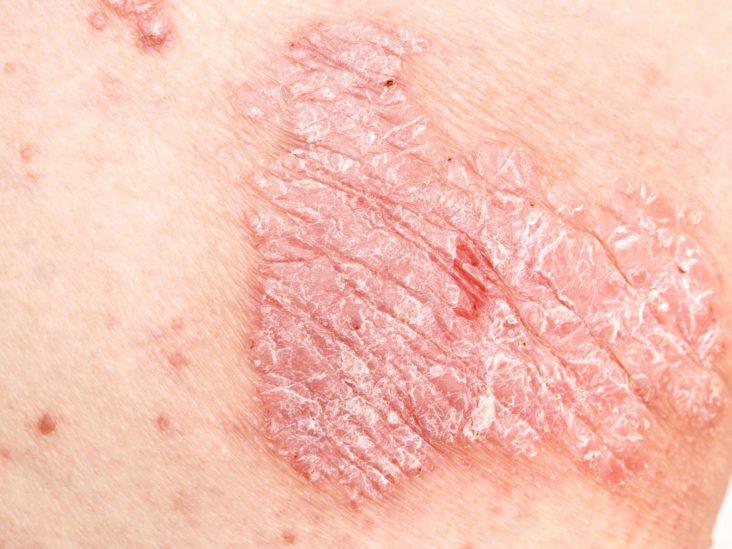Psoriasis is a skin condition that is not only embarrassing but it is also troubling. People should get it checked and treated when it in the mild stage as in later stages can sometimes also lead to death. For this one needs to understand the skin condition and its different stages and their specific symptoms. Those who think that this skin condition is genetic, psoriasis prone skin products can also be responsible for it. So, you should also keep an eye on the skin products you use. You should switch to natural and organic options, if you notice any kind of allergies.
Symptoms of Psoriasis
Psoriasis is divided into few types, each type has unique symptoms. However, there are some general symptoms which are:
- Painful and itchy skin that can lead to bleeding or cracks.
- Pitting and discoloration in the toenails and fingernails.
- The scalp is covered with scaly plaques.
- Red patches or rashes, inflamed skin in the beginning and over time, the plaques grow and cover a large area.

Symptoms in different types of psoriasis
Scalp psoriasis
Psoriasis grows on the scalp that can be seen on the back side of the head, forehead, and backside of the ears. Normally, the symptoms of the scalp psoriasis are:
- A dry scalp
- Temporary hair loss
- Red patches on the scalp.
- Flakes types silvery dandruff on the scalp.
Plaque psoriasis
This is called as psoriasis vulgaris. It is normally a buildup on knees, lower back, and elbow skin. However, it can appear on any area of the body but mostly seen on the elbows and knees. It covers a large area of skin and appears as silvery or white. The symptoms of this disease are quite different.
- Create problem for the nails.
- Create burn or itching problem in skin.
- The skin gets dry with red circular patches.
Guttate psoriasis
This psoriasis is seen as red spots and dots on the skin which covers a large area of the body. However, red spots are not thick as in the plaque psoriasis. This often happens in young adulthood or childhood. Symptoms of this type of psoriasis are:
- A number of red, and small spots spread over the skin.
- Rashes appear on the trunk part or anywhere on the body.
- Sudden appearance of rashes just after infection or illness.
Pustular psoriasis
This type of psoriasis is seen as white blisters which are full of pus. These blisters can appear on the fixed area or the whole body. In the starting of this type of psoriasis, the skin becomes red. After the treatment, the skin becomes scaly. Palmoplantar pustulosis is the specific kind of this psoriasis in which blisters are seen on the soles and palms of the feet.
Inverse psoriasis
This type of psoriasis is seemed as red marks where the skin is folded like in the groin, and armpits. This normally happens on the body part like under the breasts, behind the knee, groin, and armpits.
Erythrodermic psoriasis
Psoriasis normally happens in the moderate or mild stage, but this type of psoriasis is severe and can be the cause of death. Symptoms of this disease are very dangerous:
- Skin can peel off in bed sheets.
- Red, and inflamed skin covers a large area.
- Severe pain, burning, or itching
- High heart rate
- Lower or higher body temperature
- Swelling in ankles or feet
- Burned type skin
People, who suffer from this psoriasis, have high risk of pneumonia or heart failure.
Causes of psoriasis
Psoriasis is a genetic disease. It generally transfers from parents to children. However, this is not contagious and happens because of genes or immune system problem.
Immune system
White blood cells, the lymphatic system, the thymus, etc. are a part of the immune system. T-cells or white blood cells fight with viruses and bacteria that make you sick. When there is a problem in the immune system, WBCs start attacking the skin cells of the body. So, body will make new cells that pile up on the skin and you will see psoriasis as a result.
Genes
You might know that psoriasis is a genetic disease. Person whose parents had psoriasis in the past are more likely to suffer from the same problem.
Alternative medicine
There are many alternative therapies such as creams, dietary supplements, herbs, and special diets that fight your psoriasis. There are some alternative therapies that are high effective:
Fish oil supplements – Oral fish oil is very effective to sooth your skin. It is used with UVB therapy. Apply fish oil on the damaged area and cover it using a dressing for at least 6-7 hours and regularly apply it for one month.
Oregon grape – Oregon grape helps to improve the skin infection. Apply barberry to the affected area and it helps to give relief from psoriasis.













